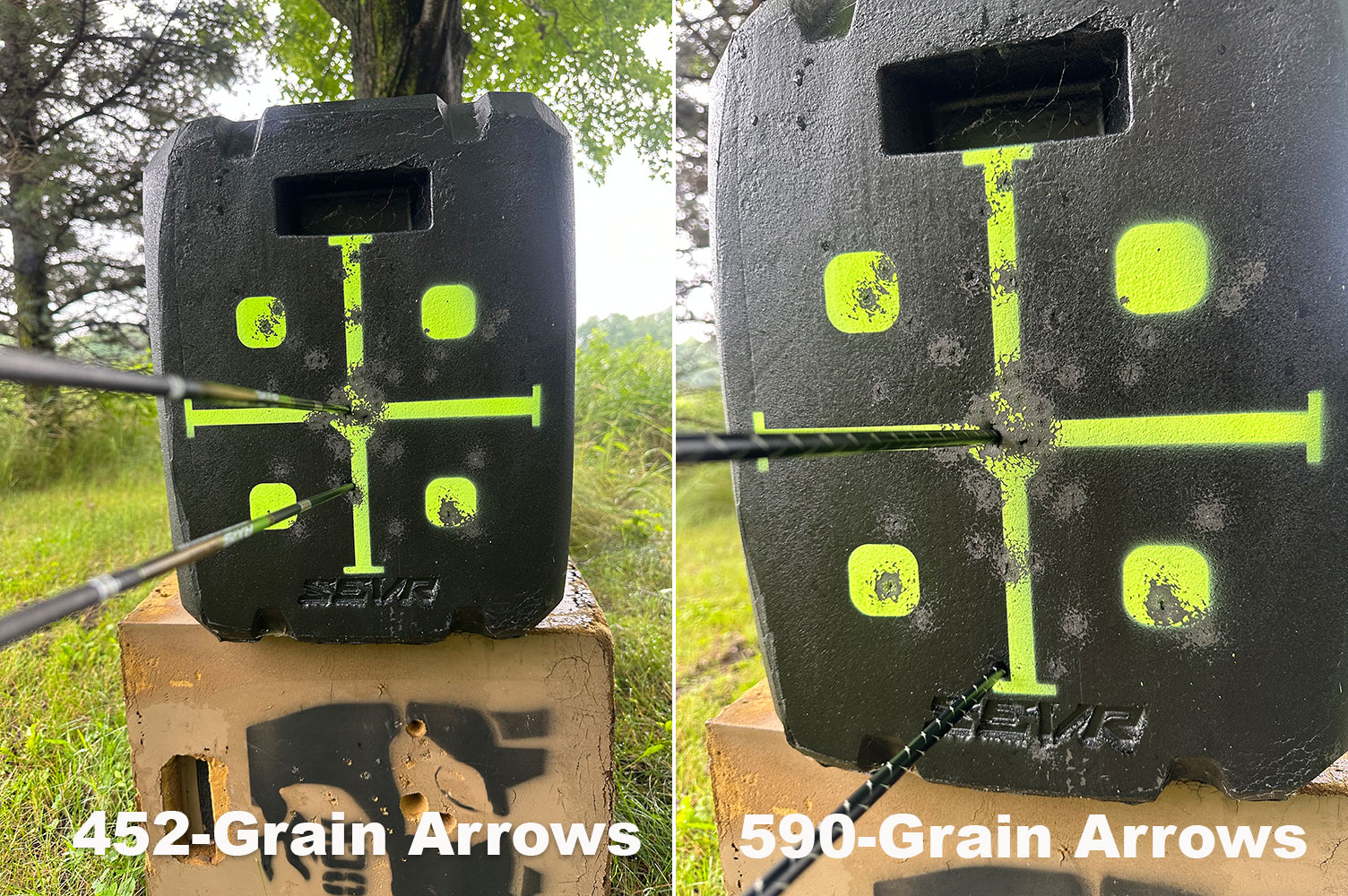Over the last several years, heavy hunting arrow setups have become popular — and for good reason. All other factors remaining equal, a heavy arrow will penetrate better than a lighter arrow. Good penetration is important for making quick, ethical kills on game animals.
Some of the most prominent personalities in the heavy-arrow discussion have been The Hunting Public crew and Troy Fowler, better known as the Ranch Fairy. These guys have been experimenting with arrow setups for years and they recently dropped a video outlining the specific setups (relatively heavy ones) they’re each shooting this season.
The video is useful because there aren’t a ton of mainstream options out there for hunters wanting to move up to heavy arrows. Here, the crew is all shooting Sirius arrows and the company offers “EZ Button” arrows that Fowler designed himself. You simply input your desired spine and arrow length and Sirius builds them for you.
But before you start searching for the heaviest arrow you can find, or conversely, scoffing at the heavy arrow trend in general, there are a few basic concepts you need to understand.
Understanding Hunting Arrow Weights
What exactly constitutes a “heavy arrow”? For compound bow shooters, a heavy arrow would be 500 grains (including the point/insert weight) and up. In this video, all of the THP crew is shooting arrows in the 550- to 650-grain range, but it’s also worth noting they’re also all shooting 70 pounds of draw weight (we’ll get to why this matters in a moment). Some bowhunters even opt for ultra-heavy arrows in the 700-grain-plus range.
Medium-weight hunting arrows hit the scales in the 450-grain range.
Light arrows run in the 400-grain range and less. Light arrows are great for 3D shooting, but they’re not a good choice for hunting.
Heavy Arrow Pros
Better penetration. To oversimplify, and avoid doing bowhunter math, heavier arrows penetrate better because they deliver more momentum (mass X velocity). Penetration is required for a broadhead-tipped arrow to sever an animal’s vital organs and make an ethical kill. To be clear, almost any basic hunting arrow tipped with a quality broadhead and fired at average draw weights will provide sufficient penetration on a perfect, close range, broadside shot through the vitals of a whitetail deer. But not all shot opportunities are perfect. Penetration becomes more of an issue when taking quartering shots, when your broadhead hits bones, or when you’re shooting bigger game, like elk.
Reduced wind deflection. At long distances, light arrows are pushed off target more easily by strong winds than heavy arrows are.
Quiet. Heavy arrows tend to make for a quieter shooting compound bow. The common understanding is that this is because they require more energy to get moving at the shot, so there’s less vibration sent through the bow (since that energy is being transferred to the arrow).
Heavy Arrow Cons
Increased drop. Heavy arrows are slower, but that’s not really an issue on its own. Heavy slow arrows kill just fine. The problem is that heavy arrows drop much more significantly as they fly down range. At close distances, this is a non-factor. But beyond 30 yards making a ranging mistake with a heavy, slow arrow could lead to a bad hit.
To illustrate this, I shot two arrow setups (medium and heavy) at 30 and 35 yards. I shot these from my 67-pound Bowtech Core SR at a 29.5-inch draw length.
The medium-weight arrow setup hit the scale at 452 grains. It dropped an average of 2.25 inches from 30 to 35 yards.
The heavy arrow weighed 590 grains. It dropped an average of 4.5 inches.
The takeaway? If I were to misjudge the range of a deer at 30 yards, I’d still likely make a good killing shot with the medium weight arrow, as 2.5 inches low would still hit vitals. However if I made the same range judging mistake with the heavy arrow, there’s a good chance I’d miss the vitals with a marginal hit. Because arrow drop is exponential, this becomes even more of an issue at longer ranges. And even with laser rangefinders, bowhunters still have to estimate range when an animal moves after you come to full draw.

Photo by Alex Robinson
They can encourage pulling too much draw weight. If you want to flatten that trajectory of your heavy arrow, you can of course increase the draw weight of your bow. That’s fine if you build up to it. But hunters who draw too much weight tend to sacrifice form, accuracy, and they get injured more often. This isn’t really a ding on heavy arrows, but more a function of human nature.
Can require more tuning and an understanding of arrow spine. If you’ve been shooting an arrow with a 350 spine and a 100-grain point for a total weight of 450-grains, you can’t just screw on a heavier point to bump up your arrow weight. Adding point weight weakens an arrow’s spine and your once tuned arrow setup is now a flying noodle. To increase point weight, you’ll have to up your spine stiffness and retune your bow. Happily, many of today’s best compound bows make tuning much easier than it used to be.
Read Next: Best Hunting Arrows
Final Thoughts on Hunting Arrows
There’s a lot more that goes into a killer arrow than how much it weighs. An arrow must also have a sharp, quality broadhead and be tuned properly for maximum effectiveness. Arrow length, spine, draw weight and point weight must all work together to create perfect arrow flight. So don’t worry too much about trying to hit a specific weight number when building or selecting arrows (even if you are going down the heavy-arrow track). What’s most important is that your arrow flies true and hits its mark consistently.
